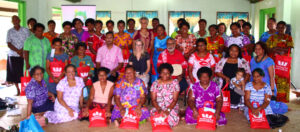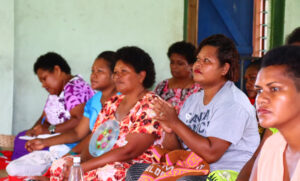Bridging the GAP: Women Empowerment in Rural Communities
July 21, 2022

By Fiona Uagunu
The Famous Iron Lady of Britain and longest serving Prime Minister of the United Kingdom, Margaret Thatcher once shared, “Any woman who understands the problems of running a home will be nearer to understanding the problems of running a country.” As the International Women’s Day was commemorated and celebrated across the world on 8 March this year, 60 women from the Tikina of Dreketi in Rewa were part of the “Bridging the Gap Program” in Vunisinu Village, Rewa.
The program is part of the Women Entrepreneurs Business Council’s (WEBC) strategic focus on empowering women in rural communities by bridging the gap between formal and informal sector women, recognising the active role played by Fijian women in the informal sector, with long hours of unpaid labour, household management, and caring for family members while supporting the economic activities of men.
It has been largely recognised that women play a pivotal role in supporting economic development. An article[1] by Pacific women in January 2020 outlined that closing gender gaps in labour force participation rate by 25 per cent could add as much as USD3.2 trillion to the overall Asia-Pacific GDP, and that by eliminating barriers to women’s full participation in certain sectors or occupationslabour productivity could be increased by as much as 25 per cent in some countries through better allocation of skills and talent.
Recognising the benefits that WEBC can provide to women across Fiji, the council has endeavored to consistently advocate on the promotion of the interest of women entrepreneurs and those with a vested interest in business.
WEBC Chair and Vice President of the Fiji Commerce and Employers Federation, Eseta Nadakuitavuki shared that “WEBC is here for the women of Fiji. We feel our role is to represent, advocate, and lobby for all women, especially those in the informal sector that need the support to enable them to achieve more.”
The Bridging the Gap Program that was conducted in Vunisinu, Rewa will benefit those women that have micro businesses supplementing family income, with the intention of upskilling them through the business trainings.
Supported by the British High Commission and Women’s Fund Fiji, WEBC delivered similar business trainings in Navosa with the program in Rewa being the second of the planned activities to support women in informal sector and rural communities.The British High Commission’s Head of Pacific Conflict, Stability and Security Programme, Nicola Noble said “the UK is delighted to be working in partnership with WEBC, who is helping existing and aspiring women to identify and access business opportunities, whilst upskilling essential skills to better respond to business challenges.”

The women from the five villages of the Tikina Dreketi were taken through financial literacy training delivered by the Westpac Banking Corporation staff, Ms Maryangela Berwick and Ms Mariana Maivalenisau. Westpac have closely collaborated with WEBC in delivering these trainings to the women of Dreketi. WEBC member, Berny Nicholls, who is also an entrepreneur and trainer, was part of the team, sharing her experience as a woman entrepreneur and giving information on transitioning from the informal to the formal business sector.
Most of the women who attended the one-day program have some knowledge of running small businesses. The bridging the gap program allowed them to better understand and adjust to the new ways of doing business.
Vunisinu Soqosoqo Vakamarama leader, Udite Rokotuinasau shared that the training has “been an eye opener to the many opportunities that we women lack the knowledge of. The business training provided today will not only assist us in our daily budgeting but also add value to the products that we produce and sell to help subsidise the family income.”
The WEBC is committed to supporting rural communities and understanding that these women will need continued support, hence WEBC will provide follow up trainings later in the year, and also encourage these women to be a part of the Academy for Women Entrepreneurs (AWE) Program.
The support network existent within the WEBC is creating pathways for women entrepreneurs in Fiji and in the past 3 years, the council has developed an ecosystem of support that has allowed the council to thrive.Its multi stakeholder partnerships and its work across various levels from those in the formal to informal sector has given the council a lot of credibility and understanding of the work in supporting micro, small and medium enterprises and especially womenpreneurs.
Ratu Tevita Bukarau who holds the chiefly title of the Roko Tui Naduguca and is the traditional leader of Vunisinu village showed his appreciation of the program being conducted at Vunisinu for the women of his Tikina. Ratu Tevita Bukarau shared that “most micro businesses here in the village practice hand to mouth” behaviors in which they plant, sell and consume earnings for the household only. They run a business in the short period of time and tend to drift away from it because of lack of knowledge and the ability of know how. He believes that more trainings such as this with follow up support should be conducted to support entrepreneurship in rural communities.
As the country slowly rebuilds after two years of disruptive economic developments as a result of the COVID-19 pandemic, the whole dynamics around business operations has changed. This has seen both positive and negative impacts for those in business, and it has also resulted in the uptake of entrepreneurship for those that have been affected by the loss of employment.
The WEBC council believes this provides a perfect opportunity to reach out to women across the nation and empower them and support sustainable livelihoods through entrepreneurship. The 60 women that were part of the training were also provided with business toolkits and training materials that they can reflect on.
The WEBC is thankful to its partners in the British High Commission, Women’s Fund of Fiji, and the Rewa District Council of Social Services for supporting the council’s objective in empowering women in the rural communities and is excited that women’s groups are recognising the support services that are available.
A Fijian saying synonymous with the people of Rewa is “Dua Ga Na Siga Ni Cola Qele” which means “having only one day to achieve something, so giving it your all to ensure it gets “done” or simply put “commitment”.
WEBC’s drive for 2022 is commitment to women invigorating the nation, as Eleanor Roosvelt said, “A woman is like a tea bag, you can never tell how strong she is until you put her in hot water.”
[1] https://pacificwomen.org/our-work/focus-areas/economic-empowerment/
Recent Whats New
Resilience and Sustainability in Action
October 28 2025
Nalini Singh Calls for Collective Feminist Resilience
October 28 2025
